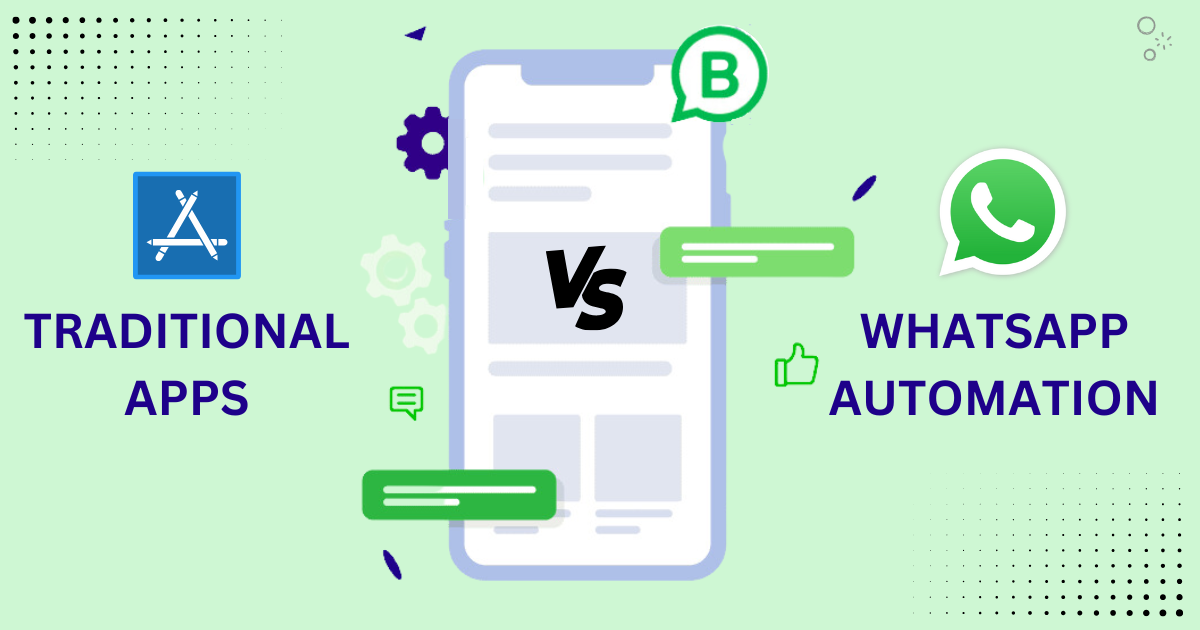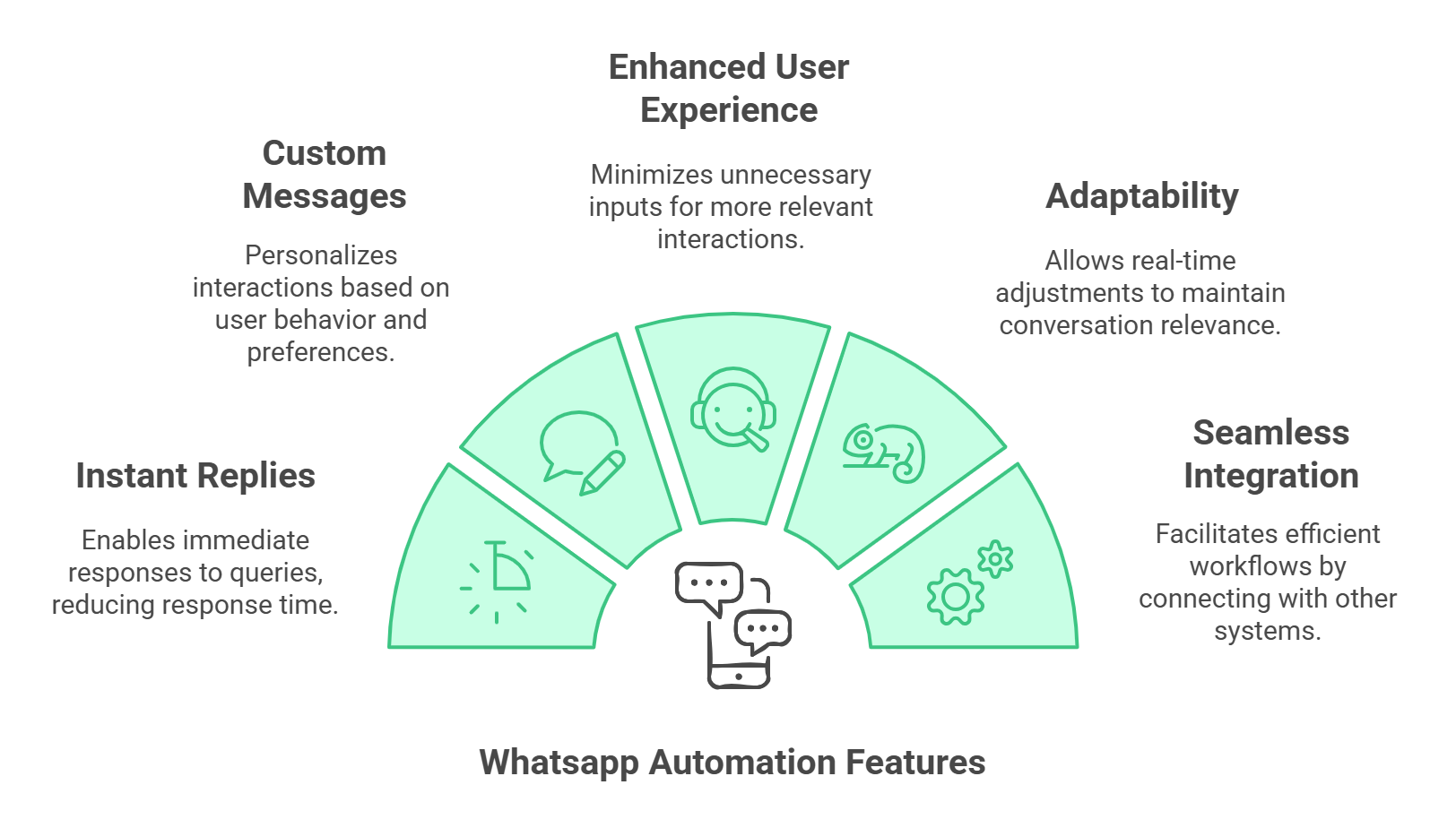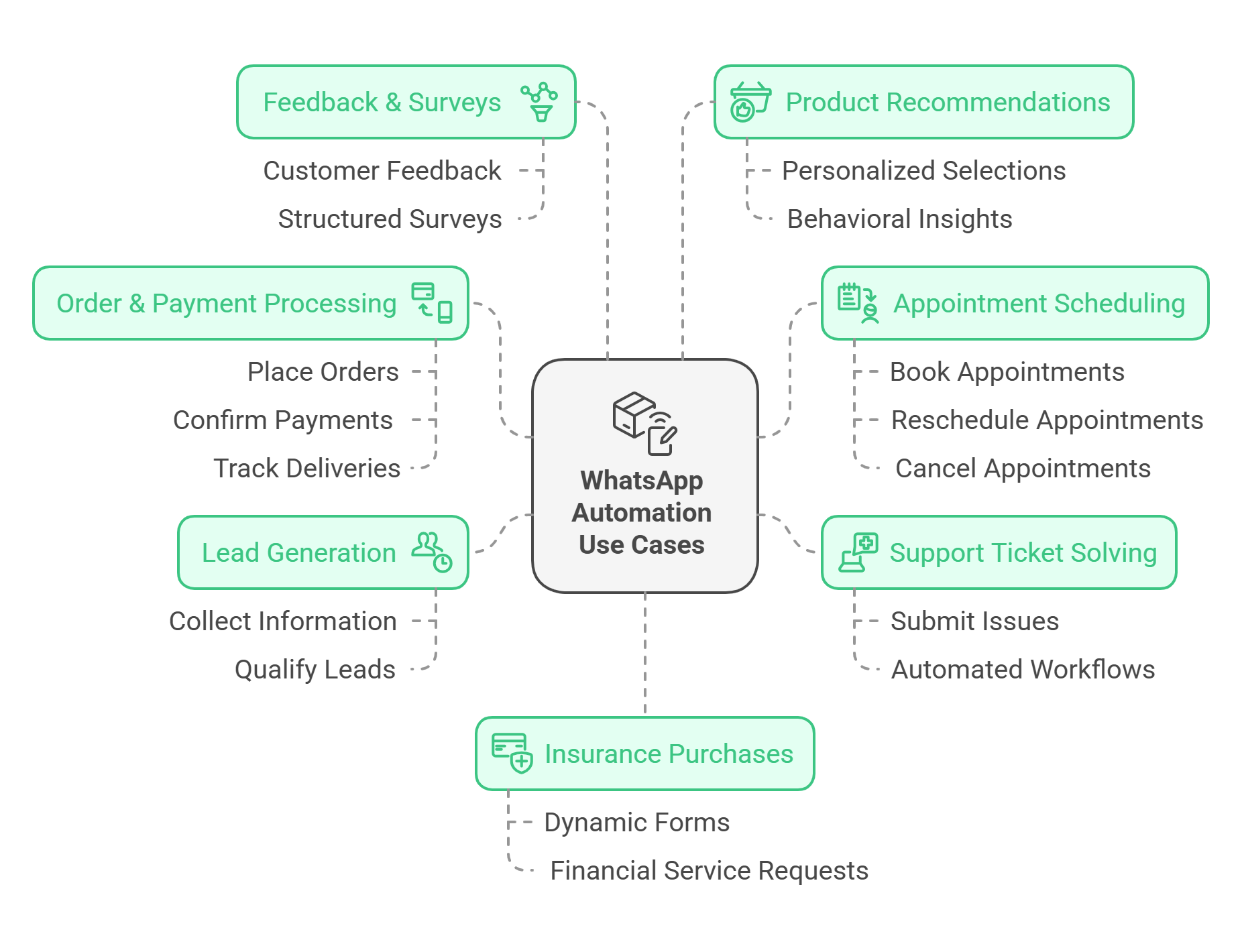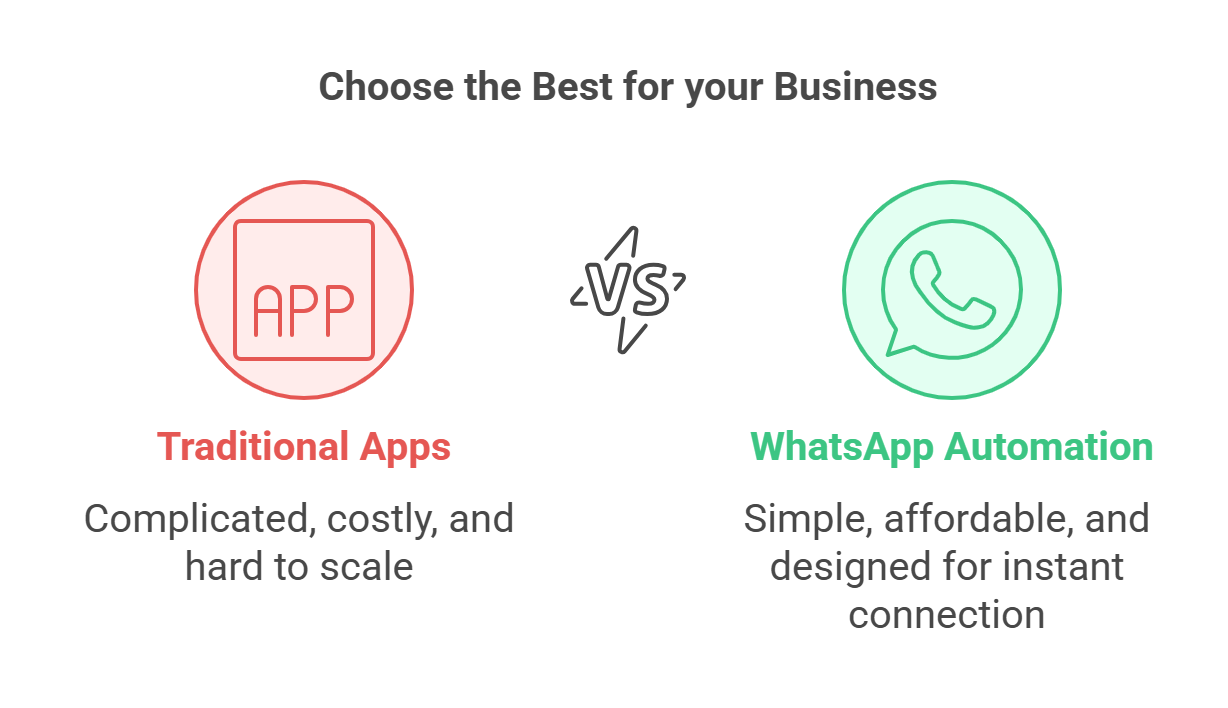WhatsApp Automation vs. Traditional Apps: Why You Should Choose WhatsApp for Your Business

- January 29, 2025
- Priyanka Shah
- WhatsApp Post
The Future of Customer Engagement is NOW
In a world that is increasingly mobile and digital-first, how businesses interact with their customers is evolving rapidly. The need for seamless, real-time communication is no longer a luxury—it’s a necessity. Enter customer engagement automation: the key to driving higher conversion rates, boosting customer satisfaction, and streamlining business operations.
For years, businesses have relied on traditional apps for customer engagement—mobile apps, CRM solutions, and ticketing systems. But there’s a new contender for the crown: WhatsApp Automation.
With over 2 billion active users worldwide, WhatsApp isn’t just for personal chats. It’s quickly becoming a powerhouse for business communication. But how does it compare to traditional, app-based customer engagement solutions?
In this article, we’ll explore why WhatsApp automation is not just the future of customer engagement—it’s the present. And how it might be time to leave behind the complicated, costly, and often outdated world of traditional apps.
Outline:
1. What is WhatsApp Automation?
- Key Features of WhatsApp Automation
- Use Cases of WhatsApp Automation
2. What Are Traditional Apps for Customer Engagement?
- Key features of traditional apps
3. WhatsApp Automation vs. Traditional Apps
4. Why WhatsApp Automation is the Future of Customer Engagement
5. How to Start Using WhatsApp Automation for Your Business
6. Make the Smart Choice—Choose WhatsApp Automation Today
What is WhatsApp Automation?
Before we dive into the comparison, let’s first understand what WhatsApp Automation is all about.
WhatsApp Automation leverages tools like chatbots, automated messages or replies, and workflows to engage customers on WhatsApp—without the need for manual intervention. But it’s not just about sending a simple “Hi!”—it’s about creating a personalized, efficient experience that mimics human interactions while delivering the speed and reliability of automation. Whether it’s answering frequently asked questions or processing payments, WhatsApp automation ensures a seamless experience for users at every touchpoint.
Key Features of WhatsApp Automation:

- Instant Replies: Provide immediate responses to common queries, cutting down response time regardless of your team’s business hours.
- Custom Messages: Personalize interactions by tailoring responses to user behavior or preferences.
- Enhanced User Experience: With tailored conversations and forms, WhatsApp automation minimizes unnecessary inputs, making interactions more relevant and engaging.
- Adaptability: Real-time adjustments to user behavior or responses ensure smooth and dynamic conversations that stay relevant.
- Lower Drop-off Rates: Targeted, relevant questions keep users engaged, leading to higher form completion and transaction rates.
- Accurate Data Collection: Capture the right data by dynamically adjusting forms based on user responses and conditions.
- Seamless Integration: Easily integrates with CRMs, APIs, and ticketing systems to create efficient workflows and automate complex tasks.
WhatsApp business automation isn’t just a trend—it’s revolutionizing the way businesses engage with their customers, making customer communication faster, more personalized, and ultimately, more efficient making whatsapp an all-in-one business automation tool.
Use Cases of WhatsApp Automation:
Here are some real-world applications of WhatsApp automation that are transforming businesses:

- Automate Order & Payment Processing: Allow customers to place orders, confirm payments, and track deliveries—all within the same WhatsApp chat.
- Support Ticket Solving: Enable customers to submit issues via WhatsApp platform, and resolve them through automated whatsapp workflows, offering quick and effective support.
- Lead Generation: Collect customer information through forms and qualify leads based on their responses, all in real time.
- Appointment Scheduling: Let customers book, reschedule, or cancel appointments seamlessly via WhatsApp.
- Feedback & Surveys: Gather valuable customer feedback and conduct structured surveys to improve your services.
- Product Recommendations: Guide users through personalized product selections based on their preferences and behaviors.
- Insurance Purchases: Use dynamic WhatsApp forms to facilitate complex transactions like insurance purchases and financial service requests.
Make insurance purchases easier with WhatsApp. Check out the full guide here.
Thanks to WhatsApp Dynamic Forms, businesses can now handle even the most complex use cases—like personalized sales interactions, appointment scheduling, and lead nurturing—with real-time flexibility. The days of relying on outdated, cumbersome systems for customer engagement are over.
Learn more on WhatsApp Dynamic Forms
What Are Traditional Apps for Customer Engagement?
Now, let’s talk about traditional apps. Businesses have used mobile applications, CRM systems, and ticketing solutions for years to engage with customers. While these tools have served their purpose, they come with a set of challenges that modern businesses are quickly growing weary of.
Key features of traditional apps include:
- Push Notifications: Notify customers about new products, updates, or offers.
- In-App Chat Support: Provide real-time assistance through a support chat embedded within the app.
- Customer Portals: Offer a dedicated space where customers can manage their accounts, track their orders, or raise issues.
The problem? These apps require customers to download, install, and adapt to yet another piece of technology. The user experience is often fragmented, and not all customers are willing to go through the trouble of navigating another app on their already cluttered smartphones.
WhatsApp Automation vs. Traditional Apps

Now that we understand both sides, let’s dive into a head-to-head comparison between WhatsApp Automation and Traditional Apps for customer engagement.
1. Reach
- WhatsApp Automation: WhatsApp has over 2 billion active users. With such a massive user base, there’s a higher chance that your customers are already using WhatsApp app regularly. The user adoption rate for WhatsApp is unparalleled, giving your business an immediate audience.
- Traditional Apps: With traditional apps, you have to get customers to download and use your app—a barrier that many aren’t willing to cross.
2. Direct Communication
- WhatsApp Automation: WhatsApp offers instant and direct communication, ensuring your message reaches the customer’s smartphone without any barriers. Since WhatsApp is one of the most popular messaging platforms, there’s a high likelihood that users have enabled notifications, meaning your whatsapp messages—whether they are whatsapp marketing communications or transactional whatsapp templates —are almost certain to be noticed. With users spending a significant amount of time on WhatsApp daily, your communication is highly visible and unlikely to be overlooked, ensuring greater interaction and engagement.
- Traditional Apps: In contrast, traditional apps may not guarantee such visibility. Customers might not have push notifications enabled, and with numerous apps sending frequent notifications, important messages or alerts from your app can easily get lost or ignored. This can lead to lower engagement and delayed responses from customers, reducing the effectiveness of your communication.
3. Ease of Integration
- WhatsApp Automation: The WhatsApp Business API allows easy integration with CRM systems, helpdesks, and other third-party tools, streamlining communication and automating workflows.
- Traditional Apps: Custom integrations with traditional apps can be complex, costly, and time-consuming, especially if you want to connect them with other tools.
4. Cost-Effectiveness
- WhatsApp Automation: No need for customers to download anything. No extra storage or updates required. WhatsApp is already on their phones, making it an ultra-cost-effective solution.
- Traditional Apps: Developing and maintaining an app can cost thousands, not to mention ongoing updates, bug fixes, and customer support.
5. User Experience
- WhatsApp Automation: Customers already receive messages on whatsapp and are familiar with the app. There’s no learning curve. The experience feels personal and instant.
- Traditional Apps: Apps often have steep learning curves. Customers may feel overwhelmed by features they don’t need or use. And they have to deal with the dreaded app updates, which can be a hassle.
6. Multimedia Support
- WhatsApp Automation: WhatsApp supports not just text messages but also rich media—images, videos, voice notes, documents—making it perfect for personalized, dynamic customer engagement.
- Traditional Apps: While traditional apps can support multimedia, the experience is often clunky and less integrated.
7. Business Functionality
- WhatsApp Automation: Achieve seamless business operations with the WhatsApp API, including:
- Order & Payment Processing: Enable users to place orders, confirm payments, and track deliveries.
- Lead Generation: Automate the process of gathering customer information and qualifying leads.
- Appointment Scheduling: Let customers easily book, cancel, or reschedule appointments without leaving WhatsApp.
- Traditional Apps: These features can be built into apps, but at a higher cost, with more effort, and often at the expense of user experience.
Why WhatsApp Automation is the Future of Customer Engagement
Let’s face it—WhatsApp Automation for business is already setting new standards in customer engagement. Businesses can use automated responses, manage customer queries, and even set away messages for when you’re unavailable—creating a seamless experience for both businesses and their customers. Here’s why:
- Accessibility: WhatsApp’s reach is global, and its user base continues to grow exponentially. This is a platform your customers are already using, making it a no-brainer for businesses.
- Real-Time Interaction: Automation allows you to engage with customers instantly—whether it’s solving a support ticket, sending personalized recommendations, or confirming an order.
- Cost-Effectiveness: The barriers to communication are lower, and the cost of entry is minimal compared to traditional apps.
- Customer Loyalty: By meeting your customers on their preferred platform, you build trust, improve customer satisfaction, and ultimately drive long-term loyalty.
Don’t just take our word for it—businesses in sectors like insurance, banking, and automotive are already reaping the benefits of WhatsApp automation, using dynamic forms and personalized workflows to engage customers in ways traditional apps simply can’t match.
How to Start Using WhatsApp Automation for Your Business
If you haven’t yet adopted WhatsApp for business, now is the time to start. By integrating the official WhatsApp Business app, businesses can quickly automate key processes like customer inquiries, appointment scheduling, and even order confirmations. Ready to make the switch? Here’s how you can use WhatsApp Automation for business:
- Choose the Right Tool: Make sure you partner with the right WhatsApp Business solution provider—someone who understands your industry (Like us!) and can customize your automation workflows.
- Integrate with Your CRM: Leverage WhatsApp’s Integration with business tools, and connect WhatsApp business API with your existing CRM, customer databases, and other business tools for seamless lead tracking, nurturing, and follow-ups.
- Segment Your Audience: Use WhatsApp’s powerful segmentation features to send personalized messages based on user behavior, preferences, and needs.
- Build Dynamic Workflows: Create dynamic forms and automation workflows to collect data, qualify leads, schedule appointments, or process payments—all within WhatsApp.
If you’re unsure where to start, Kevit.io can help you design and implement your WhatsApp automation strategy. We’re a Meta partner and can assist in lead generation, nurturing, and customer retention—all through WhatsApp.
Make the Smart Choice—Choose WhatsApp Automation Today
In a world where speed, convenience, and personalization are everything, WhatsApp Automation is the smart choice for businesses looking to stay ahead of the competition. It’s cost-effective, user-friendly, and offers a unique opportunity to engage your customers on the platform they already love.
So why stick with traditional apps that are clunky, costly, and require constant updates when you can use automation for your customer engagement seamlessly on WhatsApp?
Book a consultation with an Industry expert today to see how WhatsApp automation can revolutionize your business and drive meaningful customer interactions.
See Kevit.io In Action
Automating business processes with Kevit.io is now just a click away!